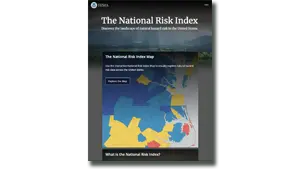 The National Risk Index is a dataset and online tool to help illustrate the United States communities most at risk for 18 natural hazards. It was designed and built by FEMA in close collaboration with various stakeholders and partners in academia; local, state and federal government; and private industry.
The National Risk Index is a dataset and online tool to help illustrate the United States communities most at risk for 18 natural hazards. It was designed and built by FEMA in close collaboration with various stakeholders and partners in academia; local, state and federal government; and private industry.
The Risk Index leverages available source data for natural hazard and community risk factors to develop a baseline risk measurement for each United States county and Census tract.
The National Risk Index’s interactive mapping and data-based interface enables users to visually explore individual datasets to better understand what is driving a community’s natural hazard risk with minimal technical expertise. Users may also create reports to capture risk details on a community or conduct community-based risk comparisons, as well as export data for analysis using other software.
Click here to view the resource.




